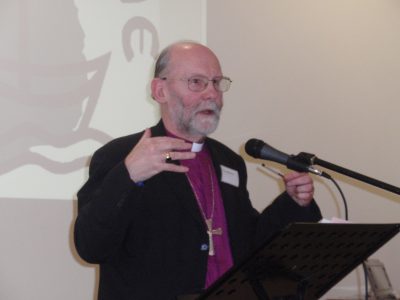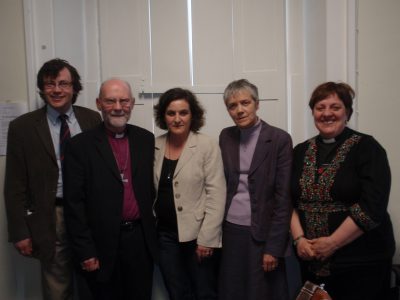Sustainable development goes hand in hand with the obligations forced on us by climate change. The alleviation of poverty, an equitable distribution of the rich resources of God’s earth, environmental conservation, and fair and just adaptation to climate change are inseparably woven together
That is the view of Bishop David Atkinson, former Bishop of Thetford, who spoke at a seminar at the Irish School of Ecumenics, Milltown, Dublin, on 24th March. Atkinson said, “The task climate change forces on us is not simply about reducing emissions, crucially important though that is. It is also about seeking a global consensus on a fair way of adapting as a planet to climate change.”
 Speaking at the seminar, which was co-sponsored by Eco Congregation Ireland and the Irish School of Ecumenics, Atkinson said that a commitment to the God who is “on the side of the poor” made it imperative for Christians to consider the needs of the poorest countries of the world as well as the poor on the margins in their own communities. “As climate change mostly affects the poor and needy of the world, the obligation to care grows on the nations which have enough,” he said.
Speaking at the seminar, which was co-sponsored by Eco Congregation Ireland and the Irish School of Ecumenics, Atkinson said that a commitment to the God who is “on the side of the poor” made it imperative for Christians to consider the needs of the poorest countries of the world as well as the poor on the margins in their own communities. “As climate change mostly affects the poor and needy of the world, the obligation to care grows on the nations which have enough,” he said.Atkinson, who is author of Renewing the Face of the Earth – a theological and pastoral response to climate change (Canterbury Press 2008), delivered a similar talk at the Irish Council of Churches AGM, which was held on 25th March in Quaker House, Rathfarnham.
 He said there was “a strong moral imperative” to do all we could to avert the danger, reduce the likelihood of global warming continuing at the present rate, and prepare for its likely consequences. There was a moral obligation on the present generation not to do things which would significantly damage the planet’s capacity to provide a home for our children and grandchildren. There was a further moral obligation to live within our means.
He said there was “a strong moral imperative” to do all we could to avert the danger, reduce the likelihood of global warming continuing at the present rate, and prepare for its likely consequences. There was a moral obligation on the present generation not to do things which would significantly damage the planet’s capacity to provide a home for our children and grandchildren. There was a further moral obligation to live within our means.People were changing the way the earth system worked. “We are now, for better or worse, active in shaping the world’s climate; we are changing nature,” said Atkinson. “And everything which depends on the weather is changing too… climate change is opening up in fresh and inescapable ways questions about our human relationship to the natural world, our human place in the natural order, the purposes for which we live and act, and the goals for human activity.”
Some would see technology as the source of our problems, but could technology also provide an answer? “Is the challenge of climate change one that can be answered in terms of human ingenuity and human technical skill?” asked Atkinson. “To do so would require global co-operation of a sort not yet seen. Is the human race capable of such co-operation?…. Even if we could agree on such co-operation, are we ready to?
“Part of the problem is that we are being asked to make decisions which are costly for us now in the hope that they will improve the world in 50 years’ time…. How do we now allow future generations to put their needs and their rights before us?”
Atkinson said that behind the covenants God made with different people in the Bible was “a deeper and more wide-ranging covenant” which was described by Isaiah in terms of a “covenant of peace”, a covenant that God made with the whole of the created order. “It is saying that all creatures receive their life from the hand of God, and that there is an interdependence between humanity and the rest of the created order,” he said.
“We humans need proper engagement with the natural order for our mutual well-being. The human covenants which we make with one another, which are intended to reflect God’s covenant with his people, are all in the context of a covenant of God’s commitment to the earth.
“Covenant, then, is the inner meaning of creation. At creation’s heart is, so to speak, the personal commitment of God to the well-being of God’s earth.”
Atkinson said that the vision of the whole creation renewed in Christ was the basis for Christian hope and the fulfilment of the covenant of peace. Isaiah spoke about a coming “new heaven and new earth” in which there would be joy, justice and ecological harmony.
“Climate change is a forceful reminder that the work of technology is not enough; humanity and the whole earth need a rhythm of worship, rest and refreshment, and need the spiritual dimensions to life and to choices signalled by the Sabbath.”
In a respondent speech at the Irish School of Ecumenics seminar, Rev Elaine Murray, Vicar of the Kilkenny group of Church of Ireland parishes, said climate change was a matter of justice. “In my diocese of Cashel & Ossory, which covers an enormous geographical area in the south east – counties Kilkenny, Carlow, Laois, Tipperary, Wexford, Waterford and Wicklow – we are trying to act prophetically by living within the guidelines of a Green Charter which affirms our commitment to environmental awareness. This charter was unanimously adopted by our diocesan synod of 2008 and has been rolled out to every parish in the diocese.
“Having ‘lived’ the charter for the last two years, we hope to bring a motion to our General Synod this May which will recommend that our green charter be adopted by the whole Church of Ireland as a possible way forward in environmental good practice.”
